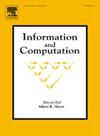概率输入驱动下推自动机
IF 1
4区 计算机科学
Q3 COMPUTER SCIENCE, THEORY & METHODS
引用次数: 0
摘要
介绍了输入驱动下推自动机(IDPDA)的一种概率变体,也称为可见下推自动机。证明了这些自动机是可以确定的:一个n状态的概率IDPDA可以接受每个概率至少为λ+δ或最多为λ−δ的字符串,对于某些孤立的截断点λ∈[0,1]δ>0,转换为一个识别相同语言的确定性IDPDA,最多有(1+1δ)n2−n个状态,最多有|Σ+1|⋅(1+1δ)n2−n个堆栈符号,其中Σ+1是字母表中左括号符号的集合。给出了一个渐近下界:对于无穷多个n,存在一个具有2n+3个状态和n个堆栈符号,且δ=1270n的概率IDPDA,使得每个等价的确定性IDPDA至少需要7n2/14个状态和至少n个堆栈符号。识别了具有较低确定复杂度的自动机的一些特殊情况。本文章由计算机程序翻译,如有差异,请以英文原文为准。
Probabilistic input-driven pushdown automata
A probabilistic variant of input-driven pushdown automata (IDPDA), also known as visibly pushdown automata, is introduced. It is proved that these automata can be determinized: an n-state probabilistic IDPDA that accepts each string with probability at least or at most , for some isolated cut-point with , is transformed to a deterministic IDPDA recognizing the same language, with at most states and at most stack symbols, where is the set of left bracket symbols in the alphabet. An asymptotically close lower bound is provided: for infinitely many n, there is a probabilistic IDPDA with states and n stack symbols, and with , such that every equivalent deterministic IDPDA needs at least states and at least n stack symbols. A few special cases of automata with reduced determinization complexity are identified.
求助全文
通过发布文献求助,成功后即可免费获取论文全文。
去求助
来源期刊

Information and Computation
工程技术-计算机:理论方法
CiteScore
2.30
自引率
0.00%
发文量
119
审稿时长
140 days
期刊介绍:
Information and Computation welcomes original papers in all areas of theoretical computer science and computational applications of information theory. Survey articles of exceptional quality will also be considered. Particularly welcome are papers contributing new results in active theoretical areas such as
-Biological computation and computational biology-
Computational complexity-
Computer theorem-proving-
Concurrency and distributed process theory-
Cryptographic theory-
Data base theory-
Decision problems in logic-
Design and analysis of algorithms-
Discrete optimization and mathematical programming-
Inductive inference and learning theory-
Logic & constraint programming-
Program verification & model checking-
Probabilistic & Quantum computation-
Semantics of programming languages-
Symbolic computation, lambda calculus, and rewriting systems-
Types and typechecking
 求助内容:
求助内容: 应助结果提醒方式:
应助结果提醒方式:


